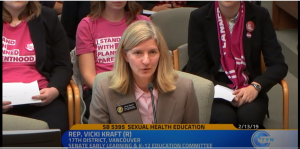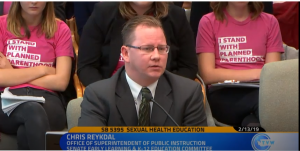Why one Clark County lawmaker spoke up about a sex ed bill

State Rep. Vicki Kraft speaking about a sex ed bill before the Legislature.
When the Legislature is in session, it’s not uncommon for lawmakers to appear before various committees they don’t sit on to speak on behalf of bills they’ve sponsored. But earlier this week, a Republican lawmaker from Clark County made an unusual appearance before a legislative committee.
On Wednesday, the Senate Early Learning and K-12 Education Committee held a hearing on Senate Bill 5395. The bill would require every public school to provide comprehensive sexual health education, which is currently optional in Washington.
According to a staff summary of the bill, the curricula adopted by districts would need to be “evidence-informed.” It would also need to be designed to encourage healthy relationships and consent while helping students avoid sexual violence.
State Rep. Vicki Kraft, R-Vancouver, appeared before the committee in opposition to the bill. She said that she felt so strongly about it that she was willing to step away from her regular legislative duties in the House to make sure that her voice and her district was heard.
“I would ask that school board members, school district administrators, school administrators and our Washington Education Association members be really cognizant that if this bill passes, I truly believe, you are going to see a flood and exodus of students out of school,” she said. “Funding will be impacted. So if you think you have funding challenges now, this is not going to help.
She said that while the bill seemed simple and straightforward she raised concerns about what could be in the curriculum taught in schools. She mentioned the FLASH, or “Family Life and Sexual Health” curriculum that is approved by the Office of Superintendent of Public Instruction. She also mentioned how the curriculum was considered last year by Battle Ground Public Schools, which was tabled after attracting criticism.
Kraft said that the curriculum could include teaching children in elementary students how to put on a condom using a “model replication.” She also said it teaches anal and oral sex.
“So let’s just be real about this curriculum,” she said. “It is teaching young children how to have sex.” (Her remarks were later rebutted by the superintendent of public instruction.)
Kraft referenced what she called a “very moving” speech given by a colleague from across the aisle last year about how 40 percent of transgender students are bullied or consider suicide.
Stressing her concern for “all young people,” she said that the curriculum does contain “transgender promotion at very young ages.”
“Why would we promote that type of confusion for our young children?” she said. “And I am not against the transgender community. I have met with some of those folks, lovely people.”
But Kraft added that the curriculum “absolutely introduces confusion” using public money. She said that most parents aren’t reading bills like these and are unaware of the curriculum. She said that parents should be doing this sort of education. Her remarks received applause.
Later in the hearing, State Sen. Claire Wilson, an Auburn Democrat who sponsored the bill, told the committee that the bill also covers topics like personal health, important life decisions and healthy relationships based on mutual respect. She said the topics will be age-appropriate and there will be an opt-out for provision for concerned parents. She said she’s heard from students and youth-oriented institutions that the curriculum is in demand.
“Often when people hear the term ‘sex ed,’ their minds get wrapped around the idea of sex and they forget about the health aspect and the fuller education that’s necessary if we want teens to make informed choices,” Wilson told the committee.

state Superintendent Chris Reykdal speaks about a sex ed bill.
Describing a “profound epidemic” of our time, state Superintendent Chris Reykdal cited numbers showing that one-third of Washington girls and one-sixth of boys who graduate from high school have been sexually assaulted or coerced. Likening the situation to school districts that opted not to teach geometry or about the Holocaust, he said that it was time for “knowledge and education” to come before “historic norms.”
He said that about half of districts teach sex ed. Reykdal also said he wanted to combat some “inaccurate testimony” given earlier.
“Our standards, by grade level, never promote sex; it does not teach sex and it does not perpetuate the false lie that gender identity and ‘transgenderism’ is a real thing,” he said. “It is biology; students are born this way and we are serious about the medically accurate part of this. And while there are folks who feel very emotional about this, and I respect that, we are combating some of the ignorance out there by trying to put comprehensive education in front of kids.”
